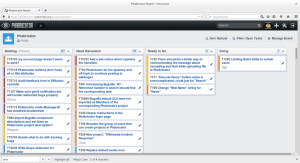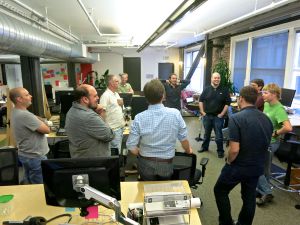
Wikimedia launches a space for collaboration open to all contributors: phabricator.wikimedia.org. Primarily devoted to software development, this platform also welcomes non-technical projects. Wikimedia Phabricator has been available since September for early adopters. Its prime time starts this week, after having incorporated 73,681 reports migrated from Bugzilla, the bug management tool that has served our projects during a decade. Farewell Bugzilla, welcome Phabricator!
As far as we know, we are maintaining the biggest public Phabricator instance in terms of number of tasks filed. Phabricator is a third-party open-source software development platform that we decided to use for project management, bug reporting, design of new features, and (one day not too far away) code review, all in an integrated fashion. Wikimedia Phabricator has already more than 800 users, who are getting their Bugzilla activity automatically assigned. New users can join and claim their Bugzilla history as well.
Main features
Phabricator comes with many improvements over Bugzilla:
- The desktop UI looks contemporary. Most features are mobile-friendly as well. Interacting via email is possible.
- Users can log in with their Wikimedia (SUL) credentials, and the LDAP access used for Labs and Gerrit is available as well. Email addresses are finally private.
- Bug reporters, developers, designers, product managers, and other contributors use the same tool to discuss issues, features, and other tasks.
- Tasks are editable, and can be assigned to multiple projects. In fact, projects are like tags in a flat structure.
- There are workboards for project planning, and possibility to upload mockups and add notes.
- Users enjoy auto-saved comments while typing.
- Users can edit their own comments (with history).
- There is no mid-air collision when someone adds a comment while you are writing yours.
Known issues
In general, fluent Bugzilla users who are new to Phabricator will need a few days to get used to the different paradigms this tool proposes.
There are some areas that require improvement:
- Suggestions for duplicates when creating a new task.
- Even if Phabricator’s search is powered by Elasticsearch, it needs some fine-tuning to get to Bugzilla’s efficiency.
- Advanced Bugzilla users will also find that some actions take more clicks (assigning blocker/blocking tasks, for instance).
There is a complete list of known issues and we will keep working on them after the launch.
Key features implemented

Phabricator is free software available for anybody. The Wikimedia Phabricator team has worked on key features to adapt it to our projects:
- Migration script keeping relevant data and metadata, allowing users to claim their activity from different services and unify it in Phabricator.
- Wikimedia Single User Login.
- Private tasks accessible to a user group and reporters.
- Separate file hosting domain.
- Automatic redirects from old Bugzilla reports to Phabricator tasks.
- Wikimedia username visible in Phabricator user profile.
- Custom IRC bot to report activity.
- Updated interwiki links and wiki templates (e.g. phab:T2001)
Also, we have updated a lot of on-wiki documentation that was related to Bugzilla. Those pages now refer and point to Phabricator.
The Phabricator upstream developers have also implemented many features and bugfixes based on our feedback, and we really appreciate their support with this undertaking.
Bugzilla archived
Existing links to Bugzilla reports are automatically redirected to their equivalent Phabricator tasks. Wikimedia Phabricator already had 1,391 tasks before the migration, and we could not assign to Phabricator tasks the same number as their Bugzilla counterparts. Instead, we are providing a memorable solution: just add 2,000 to a Bugzilla number, and you will get its Phabricator task number, i.e. Bug 123 is T2123.
Users can still check the old Bugzilla instance, now retired in read-only mode. They can log in to check their votes and their saved searches, which we could not migrate.
What comes next

The migration from Bugzilla marks the first step of the migration of the Wikimedia Foundation software development teams (who also need to migrate from Trello and Mingle), and of the Wikidata team at Wikimedia Germany (from Scrumbugz).
The RT migration is underway, coming in a couple weeks. RT is the tool used by the WMF Operations team to handle requests. Expect some thousands of additional tasks coming to Phabricator through this migration.
Code review is the next frontier. The Gerrit Migration Bot has been updated. Diffusion, Phabricator’s code repository browser, is available already now. With Diffusion, developers can import existing repositories, beginning the deprecation of another tool, GitBlit. The migration of the Gerrit code review tool will take more effort and a few months. The actual bottleneck is MediaWiki’s continuous integration system, a tough nut to crack.
Get involved
This is a very exciting project! We welcome your help.
- Learn to use Phabricator. Play and test in our Labs instance as much as you want.
- Bugzilla, RT, Trello, and Mingle users are welcome to join the Project Management project.
- Git and Gerrit users are welcome to join the Code Review in Phabricator project.
PHP developers are welcome to contribute enhancements and new features upstream. Learn more at Phabricator/Code.
And for Phabricator support and camaraderie, join #wikimedia-devtoolsconnect. See you there!
Quim Gil, Wikimedia Foundation

Can you help us translate this article?
In order for this article to reach as many people as possible we would like your help. Can you translate this article to get the message out?
Start translation